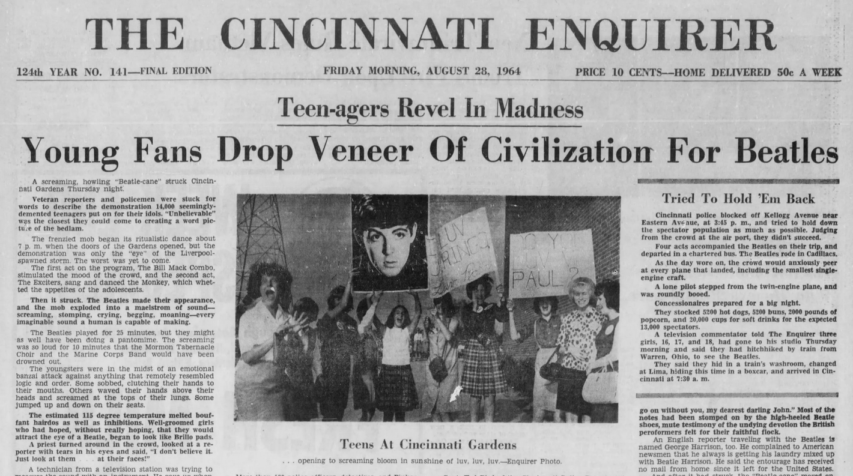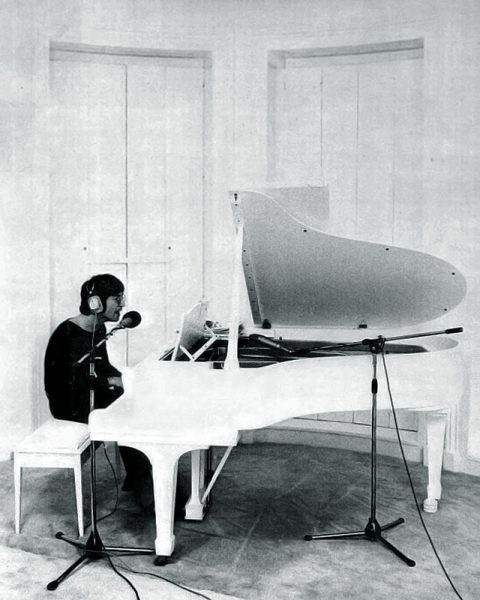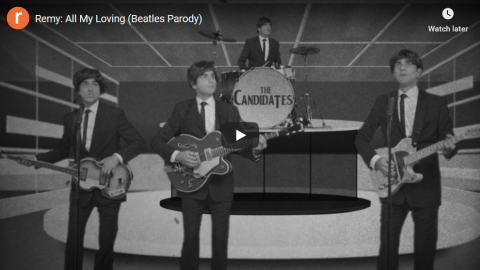Quick, ask the Boomers what was so great about The Sixties™. I hope you’ve got a few months to spare, but if you boil it all down, it’s “the spirit”. They really thought they were fundamentally transforming the world, and may God have mercy on all our souls, they were right. Same thing with the WWII generation, the Progressive Era, whatever. Even those who wax nostalgic for the 80s will talk about the feeling of the age — “the last golden Indian summer of America”, as someone quoted in the comments yesterday, and doesn’t it break your heart?
Not to get all Classical Rhetoric up in here, but for prior generations, things like “The Beatles” are synecdoche. They’ll go to their graves insisting that The Beatles were “the greatest band ever”, but if you press them on it, most of them are honest enough to admit that Ringo et al weren’t such great shakes, musically. At their best, The Beatles’ songs are musically simplistic and lyrically gibberish; at their worst, they’re “Rocky Raccoon”. The Beatles are “great” because they were innovators, not so much musically but because they were so goddamn pretentious. They wanted to be not mere entertainers, but artistes, and we indulged them, and that combo — pretentiousness and indulgence — became The Spirit of the Sixties.
Thus if you answer “The Beatles” to the question “What’s so great about The Sixties?”, it’s a synechdoche for “the spirit of the age”.
Severian, “Why the 90s Was the Worst Decade Ever”, Rotten Chestnuts, 2021-07-04.
October 20, 2024
QotD: The “Spirit of the Sixties”
February 1, 2023
It’s the job of the music critic to be loudly and confidently wrong as often as possible
Ted Gioia points out that a lot of musical criticism does not pass the test of time … and sometimes it’s shown to be wrong before the ink is dry:
When I was in my twenties, I embarked on writing an in-depth history of West Coast jazz. At that juncture in my life, it was the biggest project I’d ever tackled. Just gathering the research materials took several years.
There was no Internet back then, and so I had to spend weeks and months in various libraries going through old newspapers and magazines — sometimes on microfilm (a cursed format I hope has disappeared from the face of the earth), and occasionally with physical copies.
At one juncture, I went page-by-page through hundreds of old issues of Downbeat magazine, the leading American jazz periodical founded back in 1934. And I couldn’t believe what I was reading. Again and again, the most important jazz recordings — cherished classics nowadays — were savagely attacked or smugly dismissed at the time of their initial release.
The opinions not only were wrong-headed, but they repeatedly served up exactly the opposite opinion of posterity.
Back in my twenties, I was dumbfounded by this.
I considered music critics as experts, and hoped to learn from them. But now I saw how often they got things wrong — and not just by a wee bit. They were completely off the mark.
Nowadays, this doesn’t surprise me at all. I’m painfully aware of all the compromised agendas at work in reviews — writers trying to please an editor, or impress other critics, or take a fashionable pose, or curry favor with the tenure committee, or whatever. But there is also something deeper at play in these huge historical mistakes in critical judgments, and I want to get to the bottom of it.
Let’s consider the case of the Beatles.
On the 50th anniversary of Sgt. Pepper’s Lonely Hearts Club Band, the New York Times bravely reprinted the original review that ran in the newspaper on June 18, 1967. I commend the courage of the decision-makers who were willing to make Gray Lady look so silly. But it was a wise move — if only because readers deserve a reminder of how wrong critics can be.
“Like an over-attended child, ‘Sergeant Pepper’ is spoiled,” critic Richard Goldstein announced. And he had a long list of complaints. The album was just a pastiche, and “reeks of horns and harps, harmonica quartets, assorted animal noises and a 91-piece orchestra”. He mocks the lyrics as “dismal and dull”. Above all the album fails due to an “obsession with production, coupled with a surprising shoddiness in composition”. This flaw doesn’t just destroy the occasional song, but “permeates the entire album”.
Goldstein has many other criticisms — he gripes about dissonance, reverb, echo, electronic meandering, etc. He concludes by branding the entire record as an “undistinguished collection of work”, and even attacks the famous Sgt. Pepper’s cover — lauded today as one of the most creative album designs of all time — as “busy, hip, and cluttered”.
The bottom line, according to the newspaper of record: “There is nothing beautiful on ‘Sergeant Pepper’. Nothing is real and there is nothing to get hung about.”
How could he get it so wrong?
December 27, 2019
Imagine John Lennon as a huge hypocrite
As Mark Steyn pointed out, it isn’t hard to do:
In his Christmas sermon five years ago, the Bishop of Shrewsbury described John Lennon’s ghastly dirge “Imagine” as “heart-chilling”. Here’s what I had to say about it, and about secularism and a common culture, in the Christmas issue of The Spectator a decade earlier:
At my daughter’s school this year, the holiday concert concluded with John Lennon’s “Imagine”. The school had thoughtfully printed the lyric on the program, and the teacher, inviting the parents to sing along, declared the number summed up what we were all “praying” for. Indeed. The droning vamp began, and John’s anthem for cotton-candy nihilists rent the air:
Imagine there’s no heaven
It’s easy if you try
No hell below us
Above us only sky
Imagine all the people
Living for today …Ah, that’s the message of the season, isn’t it? Back in the Sixties, John opined that the Beatles were bigger than Jesus Christ, which was a wee bit controversial in those unenlightened times but which appears to be no more than a prosaic statement of fact as far as the music department’s priorities are concerned. These days, “Imagine” has achieved the status of secular hymn, no doubt because of its inclusive message:
Imagine there’s no countries
It isn’t hard to do
Nothing to kill or die for
And no religion, too …Hey, happy holidays!
You may say he’s a dreamer, but he’s not. A couple of years ago, it emerged that Lennon was a very generous contributor not just to organizations that support and fund the IRA, but to the IRA itself. He could certainly imagine there’s no countries, nothing to kill or die for and no religion, too, but until that blessed day he was quite happy to support a religiously discriminatory organization that blows up grannies at shopping centres in order to get out of one country and join another. How heartening to know that, though he grew rich peddling illusory pap to the masses, he didn’t fall for it himself.
“Imagine” didn’t go over wild with the parents, who mumbled along unenthusiastically. To be honest, I’d prefer John and Yoko’s peacenik dirge, “(Happy Xmas) War Is Over”, though that might be a little premature and anyway that song suffers from the disadvantage of mentioning Xmas. On the radio you can hear “Frosty” and “Rudolph” and James Taylor’s new post-9/11 version of “Have Yourself A Merry Little Christmas”, but anyone with young children finds themselves exposed to a strange alternative repertoire of unseasonal favourites. My friend Tammy emerged from her daughter’s kindergarten concert in a rage: not just no Christmas carols, but no “Jingle Bells”. The only song she recognized was Lionel Bart’s spectacular melisma pile-up from Oliver!, “Whe-e-e-e-ere Is Love?”, which is not designed to be sung en masse. “They sounded like they were dying,” she fumed, before going off to beard the school board, who explained that “Jingle Bells” had been given the heave-ho on the grounds that it might be insensitive to those of a non-jingly persuasion.
August 24, 2019
Remy: All My Loving (Beatles Parody)
ReasonTV
Published on 23 Aug 2019Remy discovers the hysterical, shrieking crowds are here for the entitlements.
Written and Performed by Remy
Produced and Edited by Austin Bragg
Music tracks and mastering by Ben Karlstrom
——————Reason is the planet’s leading source of news, politics, and culture from a libertarian perspective. Go to reason.com for a point of view you won’t get from legacy media and old left-right opinion magazines.
—————-
LYRICS:
Does adulthood dismay you?
Vote me and I’ll pay you
You won’t have to grow up it’s true
All your bills will be paid
Your adulthood delayed
And I’ll give all this money to youBob commuted to college
For discounted knowledge
So large debts he would not accrue
Lived at home, did some chores
Now he’ll also pay yours
Cuz I’ll give all his money to youAll this money
You will get from Bob
All this money
If I get this jobAll your work wages risen
Your debts all forgiven
Your childcare will be paid for too
Want free parental leave
Just takes one vote for me
And I’ll give all this money to youAll Bob’s money
I will give to you
All Bob’s money
If I win it’s true
All Bob’s money
All Bob’s money
All Bob’s money
I will give to you
February 5, 2015
Peter Freedman talks to Alan Parsons
By way of Ghost of a Flea, an interesting look at one of the pivotal men in music from the late 60s onward:
Uploaded on 28 Feb 2011
In the ‘Interview with a Legend’ series RØDE Microphones’ founder and director Peter Freedman hosts an intimate discussion with icons from all areas of the audio industry including Engineers, Producers, Musicians, Artists and Entrepreneurs.
A musical pioneer in the truest sense, Alan Parsons is one of the most revered engineers and producers in history.
Alan talks candidly to Peter about how hearing Sgt Peppers was a defining moment in his life and career, setting him on the path to Abbey Road Studios where he would play an integral role in such timeless recordings as The Beatles’ infamous Let It Be rooftop performance and Pink Floyd’s masterpiece Dark Side of the Moon.
He goes on to discuss the incredibly influential Alan Parsons Project, and the future of recording.
April 4, 2013
QotD: Declining belief in (some) conspiracy theories
In case you’re curious: The Paul-is-dead theory is reportedly embraced by 5 percent of the population — far less, no doubt, than believed it in 1968, though you might expect all those mediocre solo albums to make the theory more popular rather than less. The Icke/Slitheen thesis about reptilian overlords was endorsed by 4 percent of the country. I figure a bunch of those “yes” answers were only trolling, but some of the “no” answers surely came from people who just DIDN’T WANT THE LIZARD MEN TO KNOW THEY WERE ONTO THEM, so let’s call it a wash.
Jesse Walker, footnote to “Paul-Is-Dead Cover-Up Fools 95 Percent of America”, Hit and Run, 2013-04-03
March 27, 2013
A collaboration that should have happened
I missed this when it was posted last week:
Paul McCartney has revealed how he once asked electronic music pioneer Delia Derbyshire — creator of the Doctor Who theme music — to remake one of the Beatles’ most famous songs, Yesterday.
The former Beatle said that as a fan of experimental music he wanted the BBC Radiophonic Workshop composer to create a different version of the song.
[. . .]
Derbyshire is hailed as one of the most important figures in the history of electronic music in the UK. As part of the Radiophonic Workshop — the avant-garde wing of the BBC’s sound effects department — she created the distinctive signature tune for new TV series Doctor Who in 1963, using musique concrète techniques and sine- and square-wave oscillators to realise Ron Grainer’s score.
Derbyshire stopped making music in the 1970s, only rekindling her interest after working with Pete Kember (once of the group Spaceman 3) shortly before her death in 2001 at the age of 64.
Yesterday originally appeared on the Beatles’ 1965 album Help!. It is one of the most covered songs in the history of popular music, with more than 2,200 versions thought to exist.
September 10, 2009
Beatlemania? I’ll sit this one out, thanks
Stephen Robb looks at those poor, unenlightened barbarians (like me) who aren’t just wetting themselves with joy over the release of the remastered Beatles collection:
James Bond apparently hated The Beatles.
In Goldfinger, he advises Jill Masterson that “drinking Dom Perignon ’53 above the temperature of 38 degrees” is “as bad as listening to The Beatles without earmuffs”.
The Bond girl’s own verdict on the Fab Four, unfortunately, is not recorded before her untimely demise on the inside of a coating of gold paint.
That was 1964, when 007 may have felt threatened by that year’s global success of The Beatles’ first movie, A Hard Day’s Night.
I’m not a “hater” . . . there are a few Beatles songs I still like, but of the (quick check on the iPhone) 2254 songs currently residing in my collection, zero of ’em are by the Beatles. If I want to hear ’em, there’s plenty of “oldies” radio stations (real and virtual) offering them on regular rotation.
And I always liked that line from “London Calling“: All that phony Beatlemania has bitten the dust.






